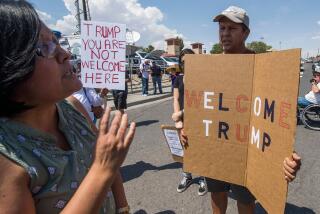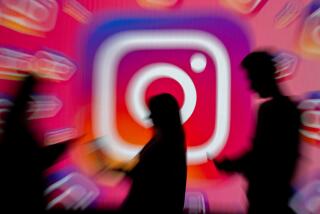Digital Age Poses the Riddle of Dividing or Uniting Society
- Share via
What would it mean to society at large if the traditional news media--newspapers, magazines, radio and television--were ultimately replaced, or at least greatly marginalized, by the reach and power of the Internet, with its ability to give users personalized news reports containing only the information that fits the profiles and preferences they have selected?
Will people’s ability to narrowly tailor all the information they receive isolate them from opposing viewpoints, thus undermining political dialogue and further polarizing the body politic? Will people thus insulated be more vulnerable to rumor, nonsense and propaganda--as may have been the case with many who have signed on to the Web sites of the Heaven’s Gate cult and other fringe groups?
This is not to suggest that the Internet is somehow responsible for the cult or their mass suicide; there were cults and mass deaths long before the Internet--witness the Branch Davidians, the Rev. Jim Jones and Charles Manson. But fringe groups--even lone individuals--without the resources to broadcast or publish their messages by traditional means can now reach a larger audience than was previously possible, and the very nature of the Internet suggests that this audience probably includes a higher proportion of lonely, vulnerable people than, say, those who watch Tom Brokaw every night.
But society’s greater long-term concern about the Internet will probably not involve those users who share a susceptibility to conspiracy theories and cult enticements but the much larger number who don’t necessarily share--or don’t choose to share--very much at all.
What will happen to our already fragmented sense of community if everyone is reading different stories on different subjects, seeing different advertisements for different products and, in essence, communicating by e-mail and in online chat rooms only with people who share their own interests?
The many flaws of the traditional news media notwithstanding, these media--daily newspapers and network television in particular--have long served as both a reality check and a kind of social glue, a common cultural reference point in our polyglot, increasingly multicultural society.
Nevertheless, Americans have historically been divided by race, language, income and education, and despite substantial progress in many areas, we are in many ways--43 years after the Supreme Court ruled that separate but equal schools are inherently unequal--more separate and more unequal today than ever before.
Will the Internet divide us still further--shattering our remaining, fragile bonds, reducing our tolerance for the inevitable differences we encounter in our heterogeneous society--and turn us into small, isolated enclaves of individual interest, each of us reading only The Daily Me?
“I worry about the atomizing forces in our culture that tend to tear us apart,” says Paul Steiger, managing editor of the Wall Street Journal. “The ability of people with like minds to talk to each other [on the Internet] is wonderful. But if only people of like minds talk to each other, you get the kind of cognitive dissonance that is destructive to a democracy.”
At the same time, however, the Internet may well benefit democracy, minimize parochialism and create new--perhaps bigger and better--communities, communities of affinity and common interest that stretch across geographic and economic boundaries in a way heretofore unimaginable except, perhaps, for the very wealthy.
A Business Week / Harris Poll last month showed that 57% of the people on the Net visit the same sites over and over, and one-third of those who use e-mail consider themselves part of an online community. Many denizens of the Net--”Netizens” in the vernacular-- increasingly regard it as a sort of home away from home, a community of its own, with its own customs, protocol and language and with chat rooms, e-mail and user groups that function as the cyberspace equivalents of the corner bar, cafe, barbershop or hair salon.
“I live in San Francisco but if I’m a Denver Broncos fan or an L.A. Dodger fan or if I want to follow Hollywood more closely than my local paper does, I can get all that stuff on” on the Internet--and chat about it, online, with like-minded folks in various other cities, says Anthony Perkins, chief executive of Herring Communications.
Moreover, says Ariella Lehrer, president and chief executive officer of Legacy Software in Marina del Rey, “The Internet lowers the barrier to entry and levels the playing field.”
Lehrer says she routinely goes online to get business and technical reports and other information that was previously available only to “experts, insiders and people with money and connections.”
The Internet is also a valuable source for medical, legal and other specialized data--and, through e-mail, an easy way for people to communicate with their elected representatives. Ultimately, the elderly and other shut-ins may be able to vote via the Internet. All these shifts are a further extension of democracy.
Similarly, the development of Internet sites everywhere will greatly reduce New York’s hegemony over the communications and publishing world--another improvement according to those who believe that diversity and decentralization are essential to democracy. (Already, for example, the two best online magazines--Salon and Slate--are based in San Francisco and Redmond, Wash.)
“We are trying to build community by enabling people to share information,” says Tim Koogle, president and chief executive officer of Yahoo! “This is better for culture-building than just about anything else I can think of.”


